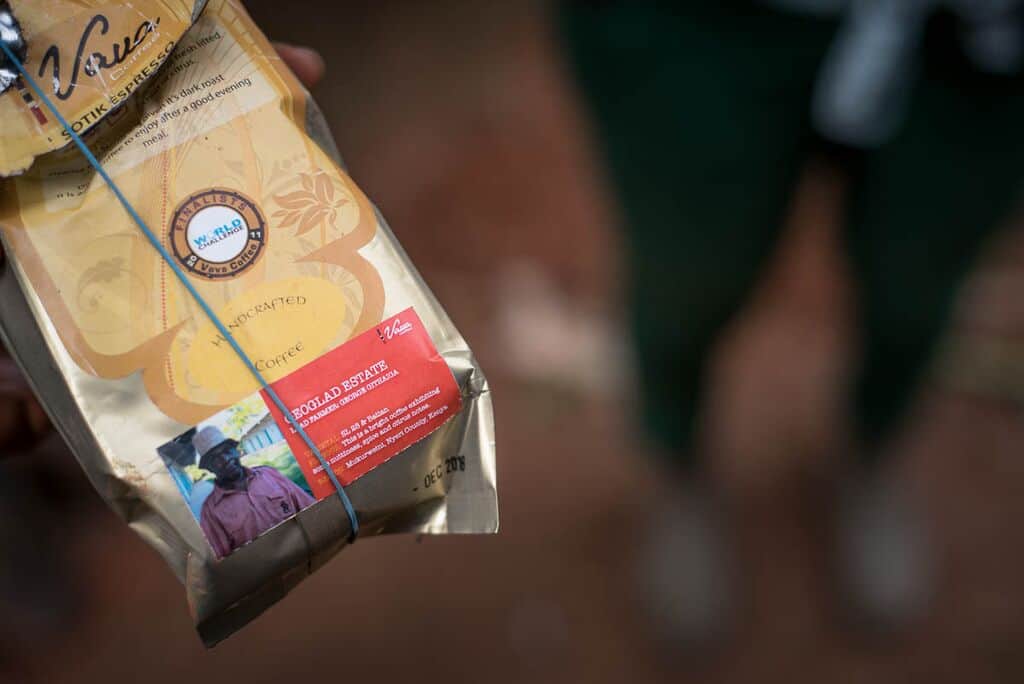‘The Face of the African Entrepreneur’
The Sankalp Africa Forum focuses on challenges facing entrepreneurs like Angwenyi
Editor’s note: The third annual Sankalp Africa Summit takes place Feb. 24-26 in Nairobi and is centered on the theme “Spurring the Entrepreneurship Economy.” Sponsored by Intellecap, the conference advances conversations on entrepreneurship, innovation and inclusive development. This Q&A previews some of the summit’s planned discussions and themes.
Vava Coffee is a social enterprise whose main aim is to contribute to better future prospects for local communities and the coffee industry as a whole. Vava Coffee is creating sustainable livelihoods for over 30,000 smallholder coffee farmers in Kenya as well as employing HIV-positive women and ex-offenders in the informal settlements surrounding Kenya’s capital. Now employing 15 full-time and six part-time staffers, the company was founded by Vava Angwenyi in 2009.
Sheena Raikundalia: Describe your business as if you’re explaining it to your grandmother or a 10-year-old child.
Vava Angwenyi: I will just describe it how I describe it to my 6-year-old every day: “Mummy sells coffee to help change lives.”
SR: Why this solution in particular?
VA: There is significant potential in the industry but while coffee is the second largest traded commodity in the world after oil, the injustices suffered by coffee farmers are atrocious. The coffee industry seems to just benefit large corporates who have been around since the colonial era.
It is time for change. I want to ensure that coffee farmers are integrated into supply chains, and trained so they understand why their coffee may be rejected by buyers, understand what international markets require, and are able to supply this. I want to ensure market transparency and that farmers get a fair price.
SR: What drives you?
VA: I have had a privileged life, studied all over the world, obtained three degrees … but rather than getting a cushy job in Wall Street, I wanted to come home and benefit my community. My father, a banker, who passed away 12 years ago, always said “employment is slavery.” That stuck in my head. Whilst entrepreneurship is not for everyone – it is tough, stressful, risky – I think that getting a steady paycheck is addictive, controlling. With Vava Coffee in addition to [making] money I am creating a sustainable form of employment for many people and making a difference.
For me it’s not about getting cash quickly. Entrepreneurship is not a microwave , it is a slow process, more of a marathon with ups and downs, which takes a lot preparation. I try and focus on the long term and not let the tough times get me down. Life is too short not to take risks.
SR: What’s been the most difficult thing about getting to where you are now?
VA: Funding! Interest rates are extremely high at around 24 percent and all loans require collateral. In fact, at the moment, demand for Vava Coffee is exceeding supply but we struggle with lack of working capital to facilitate the trade process.
Whilst there is a buzz about Kenya and money coming in, it seems to be targeted mainly in the IT and technology sector. Capital for businesses like mine is extremely tough to get. Despite the rhetoric, banks do not seem to want to lend and with other capital providers we seem to go through meeting after meeting, interview after interview, and no response. Whilst there is grant money available, this tends to be for a specific purpose.
It’s not just me – there are many hard-working, educated, passionate, driven people who want to do good things for the country but are overlooked. We tend to be in the middle tier, i.e. not the small jua kali (small business) sector who have access to microfinance loans and certainly not the big corporates whom the banks are flocking to get. We are those in-between businesses who are ignored; we are the “Forgotten Middle” who can quickly effect positive change but struggle to get the capital.
SR: What’s it like on a bad day – and on a good day?
VA: Where to start! There can be a myriad of problems to deal with: shipments going wrong, coffee burnt in the roaster, a client wants 300 packets in three days, being stuck in traffic when deliveries are due. … Good days are more than just money in the bank. For me, good days are when I know I have made a difference or even when a customer emails me saying “I love your coffee.” Makes it all worthwhile.

SR: What is the one thing you wish you’d known when you started out?
VA: I wish I had been better armed with collateral for borrowing’s sake and a bigger pile of seed funding.
Entrepreneurship is a lonely journey so it is important to create a strong support network. It is tough, people are judgmental. When I started out, I had people say to me: “That is one expensive hobby you have!” As a woman, it is even more difficult to be taken seriously. Further, there is a perception of the African entrepreneur, and if you do not fit that stereotype, woe befalls you.
Also, brand is extremely important. Don’t just focus on on making money quickly, think long-term, formalise, create good structures and a brand that outlives you.
SR: What is the entrepreneur community like in Kenya?
VA: It’s difficult. I get more support from entrepreneurs, partners and donors in the U.S. than in Kenya! I don’t know why that is, but I am looking for that spirit, support and have not really found it.
Attitudes are different. In Europe and the U.S. failure is embraced – in fact, there is a badge of honour with having a failed start-up. A now successful entrepreneur friend managed to raise $700,000 worth of funding for her business in the U.S. following on from her experience of her first failed enterprise. In Kenya we have not adjusted to the concept and there no mechanisms to deal with failure.
 SR: What do you think the world should know about African enterprise?
SR: What do you think the world should know about African enterprise?
VA: The Kenyan or African entrepreneur is not one to be pitied, we are not looking for a hand-out. We have started our own businesses, we need investment. We are looking to scale, make impact. I have done the craft fairs, entered programmes, traded in Kenya for six years. I now want to take it further – to the export markets, commercial buyers – but I need some support.
I have been sustaining my business for quite a long time. I know coffee, I am a certified coffee Q-Grader, I understand my business – the market, the demand, the potential. I go on the ground with the famers, roll up my sleeves, get my hands dirty. The face of the African entrepreneur is not a helpless-looking person – the face of the African entrepreneur is me , a fierce, female changemaker!
Sheena Raikundalia is a senior consultant with Intellecap’s consulting team in Kenya.
Top photo: Vava Angwenyi, the founder Vava Coffee. (Images courtesy of Vava/Intellecap)
- Categories
- Agriculture, Investing
